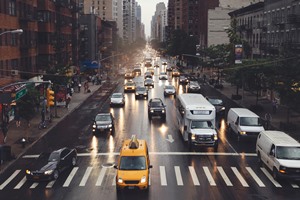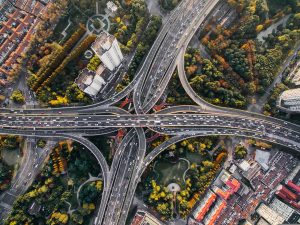World car free day – take a hike!

The first vehicle made its debut appearance in 1886 and since then the world has developed a love-hate relationship with this form of transport. As of 2022, there are 1.446 billion vehicles globally with 19% of them in the US alone. Considering this immense figure, it is no surprise that it seems almost impossible to escape the pollution, noise and danger that they produce. But when it provides people with efficiency and ease, how do you persuade a change in habit for the greater good?
Mark Onisk, chief content officer at Skillsoft, summarises “pressure is mounting for all organisations to be more socially, environmentally, and economically sustainable, with the ultimate goal of reaching a place of net-zero emissions. As our planet’s environment changes, so do its effects on the business world.”

Gerard O’Keeffe
Gerard O’Keeffe, managing director of utilities and infrastructure at Totalmobile, adds “every sector of business and industry has its role to play in changing the impact it has on our planet. Everyone has a responsibility. However, some sectors like utilities, transport, and housing are coming under the spotlight faster and more fiercely than others, proportional to their impact.”
People drive instinctively out of habit, so the aim of World Car Free Day is to make people stop and think about using alternative transport for their journeys. UK businesses are aware of the need to be more sustainable yet 70% of workers still commute by car.
Anna Allwright, Strategy Specialist for Cubic Transportation Systems, suggests “even if it’s just for one day, it forces them out of their comfort zone to do something different and, in doing this, they may come to the realisation that they prefer another mode of transportation after all.”
Climate change: the crisis, the catastrophe and the calamity.
It is nearing a year since the last COP26 meet, which witnessed an unprecedented number of multistakeholder coalitions and initiatives spanning national and subnational governments, the private sector, philanthropy, and civil society launched, a strong indication that support for climate action continues to grow.

Hugh Scantlebury
Globally, the transport sector is currently responsible for nearly a quarter of energy-related greenhouse gas emissions, whilst also being a significant contributor to fine particulate matter and nitrogen oxides which cause air pollution.
Hugh Scantlebury, CEO and founder of Aqillia, explains “the stakes are so high with climate change we’re already seeing ice caps melting, experiencing more extreme weather. It was only a few weeks ago that we were all sweltering as the UK reached a record 40 degrees.”
Let’s change to put a stop to climate change
According to the EPA, a typical passenger vehicle emits about 4.6 metric tons of CO2 per year. Compared with driving, public transportation reduces CO2 emissions by 45%, decreasing pollutants and improving air quality.
Cubic’s Allwright says “decreasing vehicle miles of travel will reduce congestion and harmful CO2 emissions. Plus, walking or cycling to work not only helps the environment but also gives people an opportunity to increase their activity levels during their commute. There are obvious benefits, such as reducing the risk of heart disease and weight management, that walking has on your health. Decreased stress from not having to sit in traffic is another benefit.”

Aqilla’s Scantlebury elucidates, “simply travelling on public transport can, therefore, have a hugely positive impact on the environment. For this reason, at Aqilla, we don’t offer company cars, and our office is less than 200 yards from the train station. We take our Corporate Social Responsibility (CSR) very seriously and help our employees to make more ecological and sustainable decisions.”
Companies encouraging clean transportation can play a huge part in reaching global sustainability goals. On top of this, businesses can also ensure their products and equipment are green, ensure their technology and electricity usage is energy efficient, provide environmental training alongside health and safety, and provide employees incentives to be green.
Skillsoft’s Onisk summarises, “from natural resources to energy sources to supply chains, businesses must adapt or be left behind. The time is now for business leaders to invest in upskilling current and future green talent and for the global workforce to do its part to learn individual green skills that, together, will drive collective change.”
World car free day one small step for man, one huge step for mankind

Anna Allwright
As previously mentioned, transport is currently responsible for 20% of global greenhouse gas emissions, and this impact just keeps growing. However, if managed sustainably, it can enhance economic growth and improve accessibility, alongside achieving better integration of the economy.
Aqilla’s Scantlebury alludes, “climate change has the potential to be a bigger disaster for humanity than COVID. It is time we started to act and be more responsible without carbon footprints and World Car Free Day is a great place to start.”
Expectations of businesses are set to grow as more and more people start paying attention to the climate crisis. It is important for organisations to ensure that their actions are successful in helping the environment before the limelight is shone on them, displaying their failures.

Mark Onisk
Cubic’s Allwright concludes, “the ultimate goal of participating in World Car Free Day is for people to realise that there are alternative ways to get where they need to go. If one person changes their habits even just for one day then that’s quite literally a step in the right direction.”
“Set to become the norm, it’s time for businesses and individuals alike to take immediate action”, finishes Scantlebury.
Comment on this article below or via Twitter @IoTGN
